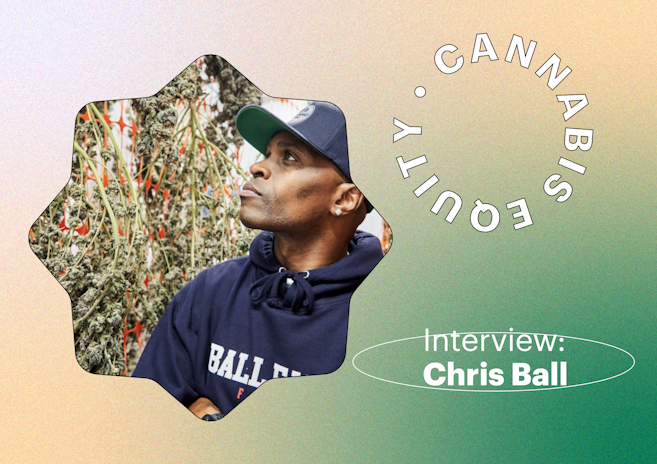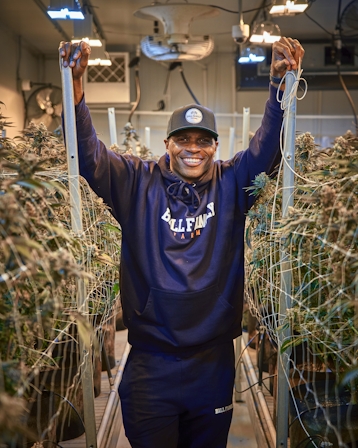
Trail Blazers: Interview With A Cannabis CEO
This is the last installment of our four-part Black History Month special dedicated to honoring and celebrating Black communities in the cannabis industry.
Chris Ball is the founder of Ball Family Farms, Inc. A 100% Black-owned, family-owned cannabis facility based out of Los Angeles. You might know Mr. Ball from his Division 1 Football days or his spell in the National Football League (NFL).
But it wasn’t always footballs and games for Mr. Ball. He was first introduced to cannabis at the age of 10, and by the age of 16 cannabis had turned into a ‘money-making mechanism’. A mechanism he used to put himself through college, where he got drafted to play D1 Football and subsequently led him into the NFL.
After his NFL adventure, Mr. Ball landed a contract with the Canadian Football League where a whole different talent developed. He started learning about botany and invested in an ultra-premium cannabis-farming operation.
This second-found passion slowly grew into what is today Ball Family Farms. An enterprise heavily involved in giving back to the community through their Social Equity Program where they help repair the harm caused by the War on Drugs. A pursuit motivated by a combination of Mr. Ball’s passions; cannabis and taking care of people.
Tell us about yourself and your journey with cannabis?
I am a legacy, or traditional market operator turned legit. I was first introduced to cannabis when I was ten years old. I recognized it as the funny-smelling cigarettes that my dad would smoke.
Fast forward to when I turned 16, I asked my cousin Errol, who was the neighborhood weed man to hook me up with my first ounce to sell. That attempt at cannabis entrepreneurship was an epic fail, so I decided that selling weed wasn’t for me. After one try I retired and focused on playing high school sports and going after an athletic scholarship. I knew my parents could not afford to send me to college. In 1995 I graduated high school but did not receive that scholarship. My dad gave me that good ol’ classic speech, “in this house, you’re either gonna work or go to school.”
At 18 I packed up, moved out, enrolled at Mt. Sac Junior College in Walnut, California and walked on to the football team. I knew this was my last shot at getting that scholarship, but I also knew I was on my own with minimal help from my parents. So I called my cousin Errol back and told him I was out of “retirement” and needed another ounce. This time I took my cannabis entrepreneurship seriously because the stakes were a lot higher. I started selling weed out of my backpack to put myself through Junior College for the next two years until I eventually received a full athletic scholarship to the University of California Berkeley.
Once I received this scholarship and started at Cal, I retired again from the weed game. My goals were to play football for the next two years, be the first kid in my family to graduate college and make millions playing in the NFL; this did not happen. I did graduate from college, but my career in the NFL was short-lived. I had a workout with the San Francisco 49ers but got released and sent over to NFL Europe. I played for one year in Berlin, Germany which was an experience.
In 2004, I signed a two-year contract with BC LIONS out of Vancouver, British Columbia; this is where the cannabis cultivation bug bit me. Canada is where I first experienced cannabis from seed to sale. Instantly I was hooked. Canada was also where I learned how to traffic weed.

Photo courtesy of Chris Ball
I am a legacy, or traditional market operator turned legit. I was first introduced to cannabis when I was ten years old. I recognized it as the funny-smelling cigarettes that my dad would smoke.
Fast forward to when I turned 16, I asked my cousin Errol, who was the neighborhood weed man to hook me up with my first ounce to sell. That attempt at cannabis entrepreneurship was an epic fail, so I decided that selling weed wasn’t for me. After one try I retired and focused on playing high school sports and going after an athletic scholarship. I knew my parents could not afford to send me to college.
In 1995 I graduated high school but did not receive that scholarship. My dad gave me that good ol’ classic speech, “in this house, you’re either gonna work or go to school.”
At 18 I packed up, moved out, enrolled at Mt. Sac Junior College in Walnut, California, and walked on to the football team. I knew this was my last shot at getting that scholarship, but I also knew I was on my own with minimal help from my parents. So I called my cousin Errol back and told him I was out of “retirement” and needed another ounce.
This time I took my cannabis entrepreneurship seriously because the stakes were a lot higher. I started selling weed out of my backpack to put myself through Junior College for the next two years until I eventually received a full athletic scholarship to the University of California Berkeley.
Once I received this scholarship and started at Cal, I retired again from the weed game. My goals were to play football for the next two years, be the first kid in my family to graduate college and make millions playing in the NFL; this did not happen. I did graduate from college, but my career in the NFL was short-lived. I had a workout with the San Francisco 49ers but got released and sent over to NFL Europe. I played for one year in Berlin, Germany which was an experience.

Photo courtesy of Chris Ball
In 2004, I signed a two-year contract with BC LIONS out of Vancouver, British Columbia; this is where the cannabis cultivation bug bit me. Canada is where I first experienced cannabis from seed to sale. Instantly I was hooked. Canada was also where I learned how to traffic weed.
In the offseason, a few of my teammates and I would supplement our income by trafficking weed from Canada, where lbs cost about $800, to my City of Angels, where lbs sold for about $3,500. I did this for years. It’s what gave me experience in the game and taught me how to be a successful drug dealer. There were a lot of good times, there were bad times.
The scariest was when the Feds came knocking at my door. I was charged with conspiracy to distribute 2,000 lbs of marijuana throughout the United States and faced a 10-year mandatory minimum jail sentence. My life was over.
I had never been in trouble with the law before and I was shitting bricks. Luckily, I was not the target of the federal case. I had just done business with the wrong guy and gotten caught up in the indictment because of it. So, I admitted what I did and signed a plea deal agreeing to serve 30 months in federal prison instead of the mandatory 10-years. After I paid my debt to society, I came out of prison with nothing. ZERO.
I was a 32-year-old loser and failure. At least, this is how I viewed myself. I had gone from college football star and graduate to a pro football player to a successful, rich drug dealer in my city to federal inmate #4577; not having a dollar to my name or a place to live. I fell into depression for months until my younger brother Charles Ball (now Ball Family Farms’ CFO) came and gave me the most significant pep talk of my life.
I picked myself up, went and got myself a job in the mall working at Abercrombie & Fitch. Yes, I was folding and selling flannels with 18-year-olds. Probably one of the most embarrassing and humbling times of my life. After two years with A&F, I got hired by Nike to run the NFL department out of Caesar’s Palace in Las Vegas. I quickly realized corporate America was just not for me. Here I was, a free man making great money with one of the most prestigious companies on the planet.
I wore shorts and tennis shoes to work and got to talk football all day, every day. But still, I wasn’t happy. The weed game was always in the back of my mind, summoning me back. So, I decided to leave Nike, return to LA, and buy my first 14 light illegal grow; my Social Equity and Ball Family Farms path began. I burnt up plants for a year straight before I finally got through my first harvest.
The second-year was a little better and because of Prop 215 I was able to sell my product here and there to keep my bills paid and the lights on at the grow. Finally, after year three, everything started to click and I began to have some success. By year four, I began making a name for myself with the Prop 64 dispensary owners. That brings us to 2018 when I learned of LA’s Social Equity license program, and Ball Family Farms was born.
What makes you passionate about being a CEO/Founder in the cannabis industry?
What makes me passionate about being a CEO and Founder in the cannabis space is that I get to participate in the post-prohibition era of cannabis in America. I have been in love with this plant since I was 16. Now I get to help pull-back the curtain on good ol’ mary jane and show people how great and beneficial she is.
How does it feel being a BIPoC founder in a predominantly White industry?
I feel vindicated being a BIPoC founder in a predominantly white industry. After everything I’ve gone through and my community has gone through all over cannabis. The lopsided incarceration rate of people of color has been completely unfair and damaging to our community. So yes, now that I have a legal license to grow and sell weed in the legal market I feel completely vindicated.
What is your all-time favorite cannabis product that you have tried?
My all-time favorite cannabis product I’ve tried is our Sativa strain at BFF called BONZAI.

Mike Ball, Chris Ball, Charles Ball. Photo courtesy of Chris Ball
What does your day look like as a CEO in the cannabis industry?
My day as a CEO in the cannabis industry is absolute craziness at times and a dream come true at others; it depends on what’s going on. It sometimes sucks because the industry is still very immature. Everything is a moving target. It’s like playing musical chairs when it comes to the rules and regulations of the industry. Nobody has a blueprint for doing this efficiently, because we are all creating this process as we go and make mistakes. It can be very frustrating and stressful.
On other days it feels like we are making excellent progress in the space and things are running smoothly. On those days, I get to sit back and remember that I sell weed for a living. And I’ve created a healthy alternative product that helps people have a better quality of life. That is the most amazing feeling in the world.
Where do you see the industry going in the next few years especially with the potential federal decriminalization?
I see the industry becoming federally legal and becoming the new answer for healthy and holistic medicine. I hope guys like myself can find strains of cannabis for every illness on the planet, so we can completely get rid of opioids and start healing people with what God has given us.
What lessons have you learned from working in the industry thus far?
A lesson learned so far in the space is that not everyone in the cannabis industry has the cannabis industry’s best interest at heart. Our job is to make sure these predators do not succeed in destroying and watering down our beloved culture and industry.
Who inspired you to become the founder that you are now?
I have three mentors who have inspired me to be the cannabis entrepreneur I am today: Al Harrington, Wilmer Valderrama, and Kevin Hart… And YOUNG JEEZY is my career theme music.
Herb Recommended Products:
READ MORE










